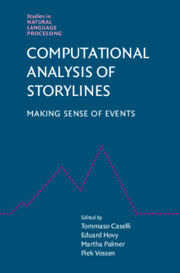Book contents
- Frontmatter
- Contents
- List of Contributors
- Introduction and Overview
- Part One Foundational Components of Storylines
- 1 The Role of Event-Based Representations and Reasoning in Language
- 2 The Rich Event Ontology: Ontological Hub for Event Representations
- 3 Decomposing Events and Storylines
- 4 Extracting and Aligning Timelines
- 5 Event Causality
- 6 A Narratology-Based Framework for Storyline Extraction
- Part Two Connecting the Dots: Resources, Tools, and Representations
- Author Index
5 - Event Causality
from Part One - Foundational Components of Storylines
Published online by Cambridge University Press: 06 November 2021
- Frontmatter
- Contents
- List of Contributors
- Introduction and Overview
- Part One Foundational Components of Storylines
- 1 The Role of Event-Based Representations and Reasoning in Language
- 2 The Rich Event Ontology: Ontological Hub for Event Representations
- 3 Decomposing Events and Storylines
- 4 Extracting and Aligning Timelines
- 5 Event Causality
- 6 A Narratology-Based Framework for Storyline Extraction
- Part Two Connecting the Dots: Resources, Tools, and Representations
- Author Index
Summary
A crucial aspect of understanding and reconstructing narratives is identifying the underlying causal chains, which explain why certain things happened and make a coherent story. To build such causal chains, we need to identify causal links between events in the story, which may be expressed explicitly as well as understood implicitly using commonsense knowledge.
This chapter reviews research efforts on the automated extraction of such event causality from natural language text. It starts with a brief review of existing causal models in psychology and psycholinguistics as a building block for understanding causation. These models are useful tools for guiding the annotation process to build corpora annotated with causal pairs. I then outline existing annotated resources, which are used to build and evaluate automated causality extraction systems. Furthermore, circumstantial events surrounding the causal complex are rarely expressed with language as they are part of common sense knowledge. Therefore, discovering causal common sense is also important to fill the gaps in the causal chains, and I discuss existing work in this line of research.
Information
- Type
- Chapter
- Information
- Computational Analysis of StorylinesMaking Sense of Events, pp. 106 - 124Publisher: Cambridge University PressPrint publication year: 2021
Accessibility standard: Unknown
Why this information is here
This section outlines the accessibility features of this content - including support for screen readers, full keyboard navigation and high-contrast display options. This may not be relevant for you.Accessibility Information
- 1
- Cited by
